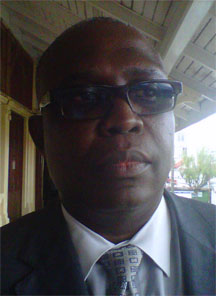Chief Justice Ian Chang yesterday began hearing legal arguments on an application by a group of civic organisations and private citizens who are seeking an injunction to prevent the holding of the general elections.
In an in-chamber hearing, Attorney Mortimer Coddett submitted that the plaintiffs, the Guyana National Council on Public Policy (GNCPP), the Guyana Trades Union Congress (GTUC), An Interfaith Group of Concerned Religious Elders (AIGCRE) and private citizens Phillip Thomas, Andres Atkinson, Maureen Williams, Mohammad Sadiq, and Juste Ramdas, were not trying to stop the November 28 elections. They are seeking to ensure that the elections are being held in accordance with the law, he said.
The plaintiffs seek to have the court grant an injunction restraining the Guyana Elections Commission (Gecom) from holding the polls until it can clearly demonstrate that it is conducting the electoral process in keeping with its legal responsibilities and that the contesting parties “are given equal opportunities in the media for explaining their policies, without being subject to the dictate of any political party.”

Among the grounds for the action is the argument that the electorate has been deprived of CNS Channel 6, which the group says is the main independent source of pertinent information necessary for the making of an informed decision.
Gecom and the PPP/C, the PNCR-1G, TUF, AFC, GAP, APNU, JFAP, WPA and GPP are named as defendants in the action.
Coddett, in his opening arguments, conceded that the court has no legal authority to stop the elections, but noted that it does have the power to protect the fundamental rights of all citizens as enshrined in the constitution.
He noted that Gecom is legally responsible for ensuring that elections when held are done in accordance with Article 162 of the Constitution, which states, in part, that “The Elections Commission shall issue such instructions and take such action as appears to it necessary or expedient to ensure impartiality, fairness and compliance with the provisions of this Constitution or any Act of Parliament on the part of persons exercising powers or performing duties connected with or relating to the matters aforesaid.” Further, if Gecom fails to ensure fairness, impartiality and compliance, a petition can be brought under the Representation of the People’s Act, to set aside an election as being void.
Coddett, who said the GNCPP’s main function is to educate and inform civil society of its rights and of the obligations which any elected government has towards them, charged that since the “elections fever has started” only a particular section is able to communicate freely to civil society.
At the same time, he added, it can harass, terrorise, victimise and polarise other participating political organisations through the media. “This wilfully planned and executed strategy has been causing growing concern which has come to a point so unbearable that this honorable court has been approached by various citizens of Guyana represented as plaintiffs in this action to safeguard and protect the rights of citizens against the abuse of power by the state or its officers in contravening the fundamental rights of individuals,” he argued.
As a result, Coddett said the plaintiff’s action is intended to ensure that the fundamental rights of citizens are protected and that Gecom carries out its mandate. He emphasised that the judiciary must act quickly in hearing and determining constitutional cases, as excessive delays in their hearing and determination make human rights protections in the constitution meaningless.
Meanwhile, attorney Anil Nandlall, appearing for the PPP/C, told reporters at the end of the hearing that he submitted that the entire action was “misconceived and wrong in law… That the parties, who are purporting to be plaintiffs, most of them are not legal entities.”
Nandlall said that the respondents that have been named also are not legal entities and “that the court has no jurisdiction at this stage or at any stage to stop the elections from being held.” He noted though that the court has jurisdiction if after elections there are deficiencies or any irregularities and an election petition is filed.
“The court has no jurisdiction before the elections to stop the election or to question the electoral process. The jurisdiction that the court has is a very narrow one,” he said, while explaining that Justice Chang has given Coddett until today to reply to the submissions made.
Representative of the GNCPP, Dr Philip Mozart Thomas said that the basis of bringing this action was to seek the attention of the Gecom in determining specifically and decisively whether or not they “feel that we the citizens of Guyana have received critical information, [and] fundamental information that is necessary for us to make critical decisions at the time of polling.”
Thomas said that for too long Guyanese citizens have been living in fear of victimisation and discrimination. “This critical information we speak about is the information concerning their policies that would affect my grandmother, that would affect my mother that would affect us, that would affect our children,” he said.







